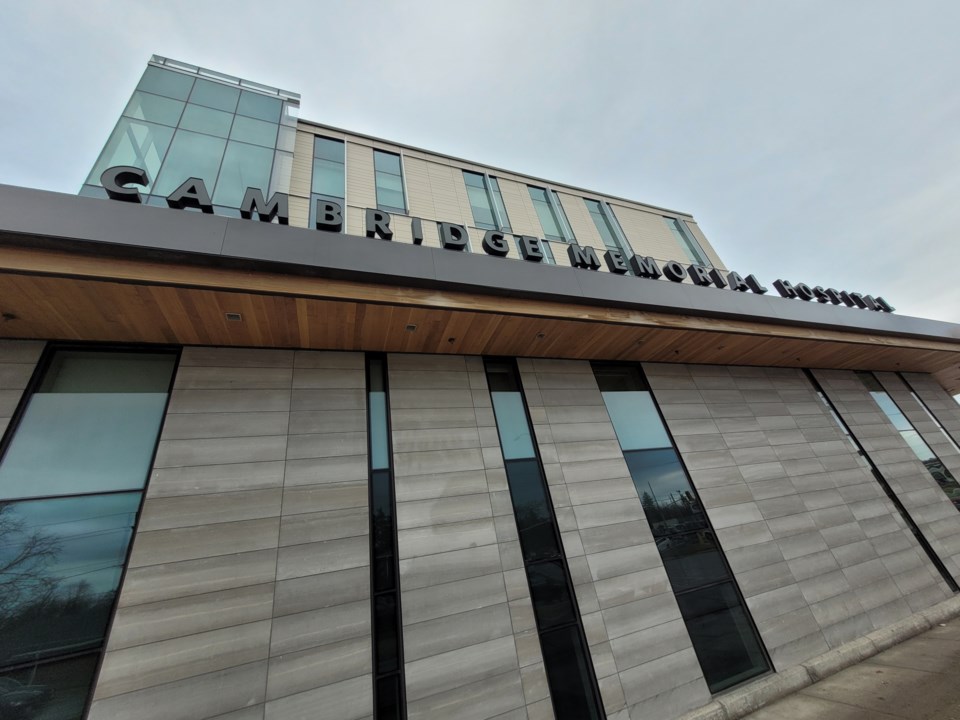Wait times in emergency rooms across the province have become seemingly inevitable.
But when Heather McGregor was sent to Cambridge Memorial Hospital by her employer for an x-ray for what was thought to be pneumonia, she was still shocked at just how long the process took.
Upon arriving at the hospital at 7:40 p.m. on Nov. 27 she was greeted by a full emergency room.
After waiting to be registered, she was triaged.
"I found out afterwards from triage that she didn't ask me most of the necessary questions, she did not give me a Covid test or a mask, which was required due to my symptoms and she did not advise me to sit in the isolation room," McGregor said.
"Once I was called in for triage, I was given a mask, my vitals taken, all of my info updated and a thorough report of my symptoms was taken. The triage nurse was wonderful."
Roughly two hours later, McGregor was sent for a x-ray at around 9:10 p.m., which she thought was "fantastic fast timing."
However, that's when the wait really started.
Once the x-ray was complete, McGregor sat for nearly eight hours anticipating the results.
"I sat in the waiting room, sick, bored and stressed, until about 5:30 a.m.," she said.
"I was finally taken into a room. A cold room. I was given no blanket, was not asked if I wanted a blanket. I was shown the room and then ignored until the shift change happened and the doctor came in."
At 7:50 a.m. the next morning, she was finally able to leave after being seen.
Stephan Beckhoff, manager of public affairs and communications for CMH, said hospital staff are constantly monitoring the state of the emergency room, with priority given to the sickest patients.
"The goal is to ensure optimal staffing, which is reassessed daily," Beckhoff said.
"When inpatient units are full, patients in the emergency department that need to be admitted wait there. This then reduces the capacity of the emergency department team to see patients as they are now caring for admitted patients."
With respiratory illness season having arrived, staff are also preparing for what could be an influx of patients over the coming months.
On days it typically sees more patients, such as Boxing Day, more staff are automatically called in. The newly refurbished Wing-B, which is slated to be complete in early 2025, is also going to be utilized.
With projections indicating respiratory illnesses could increase in January and February, the hospital has delayed moving its Acute Rehabilitation program back to Cambridge from Grand River Hospital. It's temporarily set up at the Freeport Campus while construction of Wing-B is completed and was slated to return on Jan. 31, a date that's now shifted to March 31. It was a decision made to increase bed capacity during that time, Beckhoff said.
The newly launched CMH@Home program, in partnership with Bayshore Integrated Care, was recently launched to allow hospital staff to safely discharge patients based on severity while ensuring they have access to care they need.
"This should reduce their time in hospital and make their bed available for other admissions," Beckhoff said.
"Both strategies will pull admitted patients faster from the emergency department, which will enhance the emergency departments team’s ability to care for emergency patients."
Reflecting on her personal experience, McGregor's issue wasn't with the quality of care she eventually received, saying the nurses and doctors were professional and caring. It was with communication.
"There was zero communication," she said.
"I had nobody communicate that they were short on doctors. I had absolutely nobody communicate that I would have to wait until a shift change was over to see a doctor, get my x-ray results and any necessary prescriptions. Had there been communication, I may have been less anxious about what was wrong with me."



